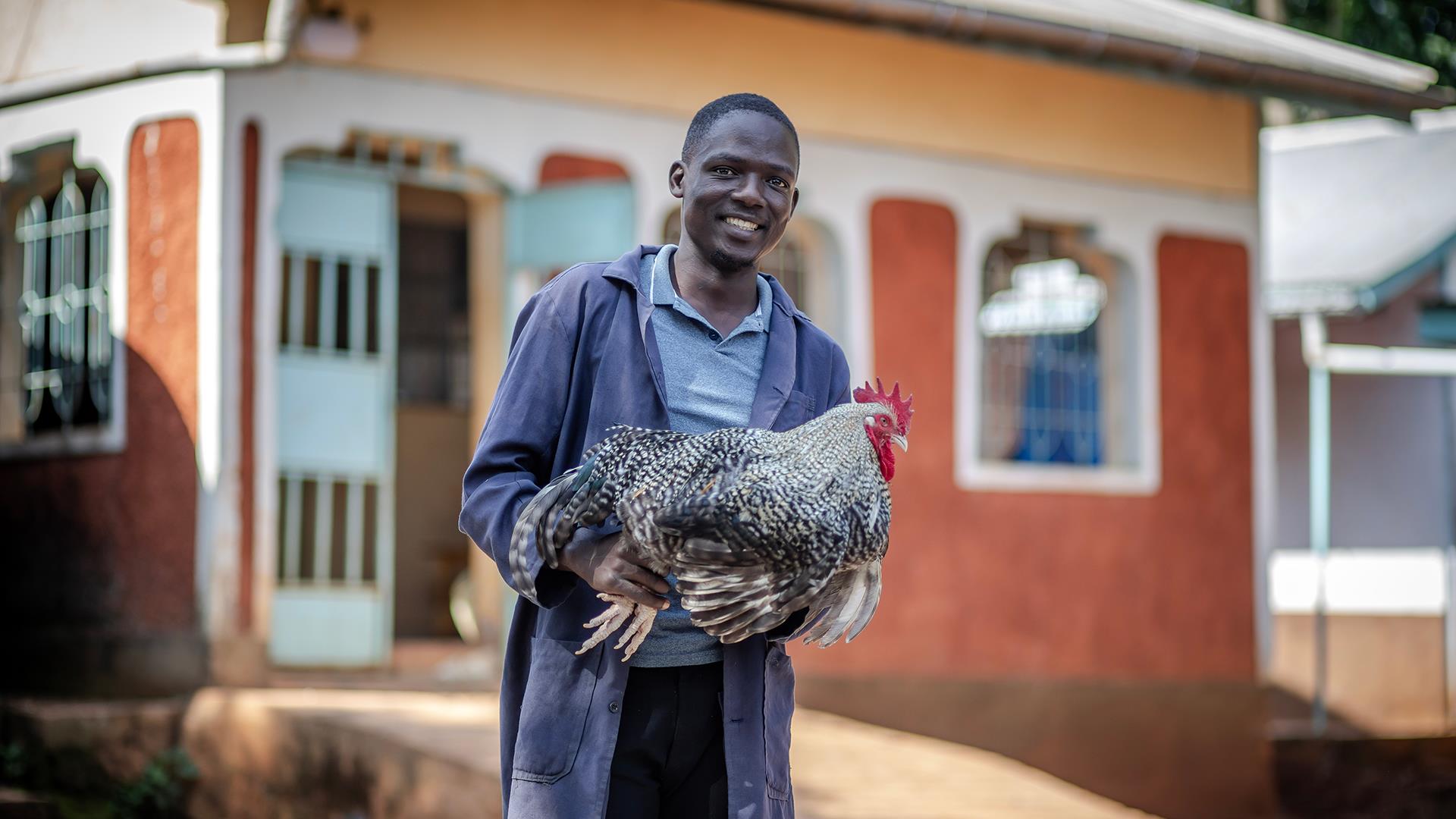
Proving that disability is not inability
Creating job opportunities in agriculture for youth with disabilities in Kenya
Stephen Omondi Odhiambo, a member of the Siaya Disabled Peoples Organization in Kenya, acquired valuable skills in poultry farming through an FAO programme that trains youth with disabilities for jobs in the agrifood sector. ©FAO/Luis Tato
29/01/2024
Stephen Omondi Odhiambo signs the word “HEN” to his wife, Dorah Akungu, and she immediately understands. By fingerspelling words, Stephen has taught her, his family and close friends the signs for the most commonly used words and now they communicate fluidly.
Stephen himself had to learn sign language in school at the age of seven, when an illness caused problems in his ears. Despite prolonged hospitalization, he ultimately lost his hearing.
In his village of Ulafu, Siaya County in western Kenya, like in many parts of the world, people with disabilities often face marginalization. Typically, they have difficulties finding work, which leads to economic hardship, further exacerbating their situation.
The Food and Agriculture Organization of the United Nations (FAO) has been working with the Siaya Disabled Peoples Organization (SIDIPO) in Kenya to promote jobs in the agrifood sector for youth with disabilities, helping create quality work opportunities to break the vicious cycle of poverty and exclusion.
In general, unemployment is a challenge for young people in the country. Although Kenya is East Africa’s strongest economy, it has the highest number of unemployed youths in the region.
Since 2011, FAO has been implementing the Integrated Country Approach (ICA) programme to boost agrifood-based jobs for young people. The agrifood sector holds great potential to offer steady work with adequate income and do so outside of the large cities.
Stephen, who went to work in Nairobi at the age of 27, describes, “I was working at a place where they made paper for printing. When COVID-19 hit, our boss decided to downsize and some of us were made redundant. I thought it best to leave Nairobi and go back to the countryside.”
Back in his village, Stephen had friends who ran a farmers’ group, so he decided to join it. The group took advantage of an FAO training on fruit, poultry and fish farming as well as other agricultural practices.
FAO then collaborated with the Department of Agriculture of Siaya and local partners to deliver the technical training to SIDIPO members, who are normally excluded from this kind of learning opportunity.
Through this FAO ICA programme, the Government trained around 65 young SIDIPO members on various types of farming. When needed, the training sessions were delivered with the support of a sign language interpreter.
After a few training sessions, Stephen decided to focus on poultry farming.
Andrew Mwaura, FAO’s National Coordinator for ICA, says that the programme was unique because it gave people with disabilities a platform to showcase that they are able to engage in agriculture. The programme highlighted their accomplishments and provided visibility, which they did not have in the past.
Charles Juma, SIDIPO Chairman, says, “We identify the needs of persons with disabilities. We offer vocational trainings.” The FAO-SIDIPO collaboration is an example of this approach. “Our vision is a barrier-free and inclusive society for all,” adds Juma.
Analyzing the gaps and barriers to success, FAO offered specialized training or procured inputs, such as feed that had become very expensive, to jumpstart production or give agribusinesses a boost.


FAO collaborated with the County Government and local partners to deliver technical training to SIDIPO members, who are normally excluded from this kind of learning opportunity. ©FAO/Luis Tato
Along with tending to their two young daughters who also have hearing impairments, Dorah and Stephen work together in every aspect of poultry farming, augmenting their return from the activity.
“We enjoy farming so much. It is the backbone of life. We do it, and we love doing it. So from it, to get something to support our lives,” conveys Dorah.
The ICA also managed to take the trainees’ farming to another level. Most participants now have plans to expand their businesses, using FAO’s support as the impetus.
Stephen describes, “I started with only one chicken; it hatched 15 chicks. When they were big enough, they laid eggs which I sold and made some profit. I used this money to pay school fees for my daughter, who is in a boarding school for children with hearing impairments.” With a smile, Stephen concludes, “I really look forward to expanding my poultry farming.”
Maida Nyawade, Director of Youth Affairs, Gender and Social Services from the Siaya County Government, explains that they hope to mainstream this type of programme throughout the county.

The FAO programme makes agrifood value chains more inclusive for young people in rural areas, engaging youth with disabilities. Promoting quality work opportunities helps break the vicious cycle of poverty and exclusion. ©FAO/Luis Tato
Completed in December 2023, the FAO ICA programme, supported by the Swedish International Development Cooperation Agency, worked to make agrifood value chains more inclusive for rural youth in five countries – Guatemala, Kenya, Rwanda, Senegal and Uganda.
Promoting quality work opportunities helps break the vicious cycle of poverty and exclusion. It also demonstrates that people with disabilities can play important roles in the social and economic development of their communities.
Overall, the ICA programme in Kenya benefitted 64 institutions, 148 youth organizations and 3 800 youths. In addition, ICA has reached more than 14 000 indirect beneficiaries, through fairs, awareness raising activities, dialogues or digital platforms.

